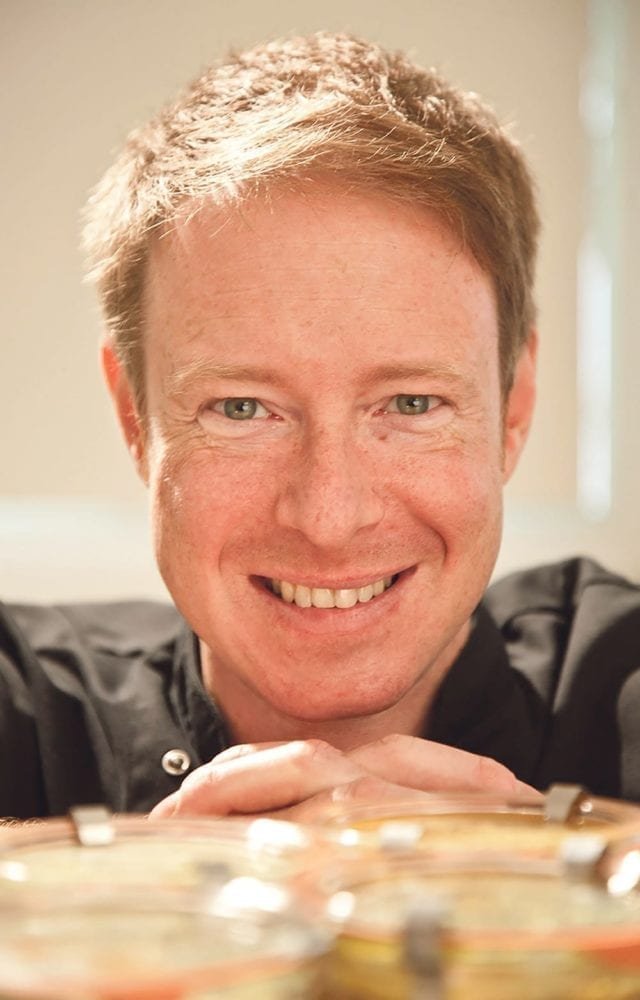We’ve come across a few organic caterers in our time, but we’ve never seen a catering company that recycles – or, to be more precise – ‘upcycles’ food. Enter iss mich! (‘eat me!’), the brainchild of waste-diving TV chef Tobias Judmaier.
 Over the last couple of years, Tobias and his team have been alerting Europeans to the issues around food waste and cooking up new ways to spread the word to the mass public. Tobias is the chef on wastecooking, an online cooking show that prepares meals from food rescued from the bin, and he launched a free supermarket in Vienna to show how much perfectly good food is wasted because it doesn’t meet the aesthetic standards and expectations of supermarkets and consumers.
Over the last couple of years, Tobias and his team have been alerting Europeans to the issues around food waste and cooking up new ways to spread the word to the mass public. Tobias is the chef on wastecooking, an online cooking show that prepares meals from food rescued from the bin, and he launched a free supermarket in Vienna to show how much perfectly good food is wasted because it doesn’t meet the aesthetic standards and expectations of supermarkets and consumers.
Speaking to PQ, Tobias said, ‘This free supermarket project was the key to iss mich!, because we made contact with the farming industry and learned about the pain of having to throw out perfectly good food due to “consumer protection” laws. This made me shift my focus, and I started a catering company using materials from the source – a perfectly legal way to obtain veggies for cooking.’
The menu doesn’t have a wealth of options, but it changes weekly and the meals are delicious, expertly prepared and made from what’s available (seasonally and logistically), using ingredients that would otherwise be pointlessly wasted. You can currently choose from around two or three soups and a similar number of main courses (usually stews), all made from mostly organic and, where possible, local ingredients. The meals are primarily vegan or vegetarian due to the ways in which ingredients are sourced. There are more health risks (and legal issues) associated with salvaged meat and poultry, yet kilos of perfectly edible vegetables never leave the farm because they don’t meet supermarkets’ strict criteria. ‘We cooperate with large farming communities which supply us with veggies that are not fit for the supermarket shelves and would never have entered the market’, explains Tobias.
The meals are stored and delivered in special glass jars that preserve the meals for two weeks – and which also save 50g of plastic packaging and 300g of food. The same jars are used to store the food that’s intercepted before it’s consigned to the dump; ‘Because the volume of vegetables left over in Austria is so enormous, we always deal with large quantities’, says Tobias. ‘The charges associated with processing, storage and distribution are a challenge, but classical “canning” in the jar is a great solution that processes the vegetables gently – and also allows us to store the food that we produce.’
On top of that, iss mich! delivers all its orders by bike to minimise its carbon footprint; meals are booked on or before the Friday of the previous week so that iss mich! can plan its cycle route. This also means iss mich!’s supply doesn’t outstrip the demand, and minimal food is wasted. As well as cycling to your office with lunch, iss mich! also provides classical catering for big events and companies, using the same ingredients and following the same philosophy.
The drive to reduce food waste has gained momentum in Austria; every year, 168,000kg of packaged and unpackaged food ends up in the bin – equivalent to roughly 40kg (€300) per household. However, more than half of the food wasted comes from producers, wholesale, retail and catering. In its ‘Roadmap to a resource-efficient Europe’, the EU announced it will assess how best to limit food waste throughout the entire supply chain, with a view to cutting the EU’s edible food waste in half by 2020.
 Play Video about This Rock Might Just Save The World
Play Video about This Rock Might Just Save The World Play Video about Play 2 hours of rock
Play Video about Play 2 hours of rock Play Video about Play 2 hours of brook
Play Video about Play 2 hours of brook Play Video about Play 2 hours of sheep
Play Video about Play 2 hours of sheep


















 Over the last couple of years, Tobias and his team have been alerting Europeans to the issues around food waste and cooking up new ways to spread the word to the mass public. Tobias is the chef on wastecooking, an online cooking show that prepares meals from food rescued from the bin, and he launched a free supermarket in Vienna to show how much perfectly good food is wasted because it doesn’t meet the aesthetic standards and expectations of supermarkets and consumers.
Over the last couple of years, Tobias and his team have been alerting Europeans to the issues around food waste and cooking up new ways to spread the word to the mass public. Tobias is the chef on wastecooking, an online cooking show that prepares meals from food rescued from the bin, and he launched a free supermarket in Vienna to show how much perfectly good food is wasted because it doesn’t meet the aesthetic standards and expectations of supermarkets and consumers. Austria has set itself a goal of a 20% reduction in food waste by 2016, and has various initiatives in place to recognise and commend those who are playing their part. The Viktakulia Awards in Austria highlight the best and most ambitious projects in the fight against food waste. This May, iss mich! won the award in the Restaurant and Canteen Kitchen category, for demonstrating ‘high creativity, effective and long-term commitment to the reduction of food waste and a high level of expertise’ in the important issue of food waste. The award was presented by the Federal Minister for Agriculture, Forestry, Environment and Water Management.
Austria has set itself a goal of a 20% reduction in food waste by 2016, and has various initiatives in place to recognise and commend those who are playing their part. The Viktakulia Awards in Austria highlight the best and most ambitious projects in the fight against food waste. This May, iss mich! won the award in the Restaurant and Canteen Kitchen category, for demonstrating ‘high creativity, effective and long-term commitment to the reduction of food waste and a high level of expertise’ in the important issue of food waste. The award was presented by the Federal Minister for Agriculture, Forestry, Environment and Water Management.
























